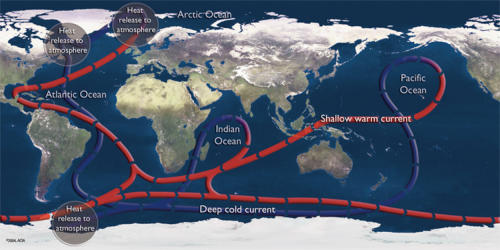OCEAN ENERGY AND CLIMATE
Climate driven ocean currents move heat energy in the oceans and so are intimately related to the mechanisms of
climate and consequently climate change. Changing ocean temperatures affect weather and rainfall distribution,
lead to melting ice-caps and sea level rise. Climate driven currents of warm equatorial seawater can damage the
marine ecology including bleaching coral reefs in the Great Barrier Reef.
Ocean currents transport heat from the equator to the poles. Warm water melts sea ice and glaciers, and reduces
ice thickness causing sea level rise. Specifically the Gulf Stream is melting the Greenland Ice Shelf, which is
diluting the salinity of the North Atlantic. This dilution slows the formation of dense ‘deep water’ and hence the
global ocean circulation system.
Changed ocean circulation
is associated with the rapid
onset of Interglacial Ice
Ages and is widely thought
to be the cause of abrupt
climate change.
LaRosa has proposed
placing arrays of ocean
current turbines in the Gulf
Stream to slow the
northward transport of heat
and so slow climate change
while generating 14GW of
renewable energy to make
the project viable.

EnGen Institute 1992-2017
The Western Pacific Warm Pool is
the main source of water vapour
which amplifies Climate Change.
The South Pacific Gyre drives hot
seawater over the Great Barrier
Reef increasing coral bleaching.

OCEAN HEAT TRANSPORT


I N
S T I T U
T E

TOTAL SUSTAINABILITY
GENERATIVE ENGINEERING OF ENGINEERED ENVIRONMENTS FOR LIFE SUPPORT




























